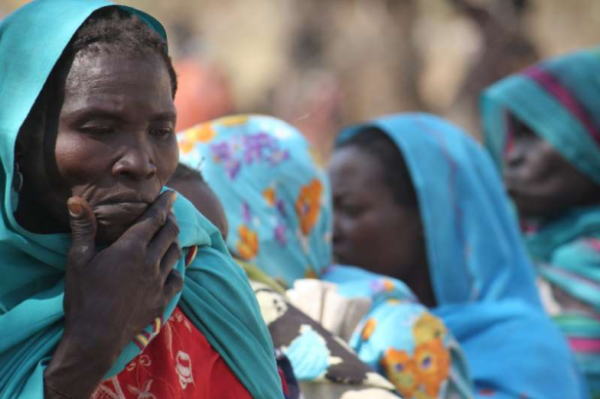
Is peace possible? Here at Invisible Children, we answer that question with a resounding “yes.” We’re investing in the best strategies to end Africa’s longest-running conflict, and we dream of a world where violence isn’t the only solution. This article by Karin Zeitvogel from Voice of America caught our attention, because it promotes female leadership as a strategy for peace in South Sudan.
The conflict in South Sudan is extremely relevant to our work (see our blog post about how the LRA is capitalizing on the conflict), and Zeitvogel’s perspective inspires us as we work to see peace in the nation. We also love the article’s affirmation of women; gender-based discrimination not only perpetuates injustice, but it deprives the world of valuable voices and contributions to the most serious problems and conflicts.
Check it out for yourself:
+++
Can Women Save South Sudan?
With South Sudan’s peace process floundering, members of the diaspora and their American supporters have come up with a possible solution: give women leadership roles and let them restore peace.
“Women bring order to things much faster than men with AK-47s,” U.S. businessman and political advisor, Ken Feltman, told a conference in Washington that was focussed on bringing sustainable peace and economic development to South Sudan.
“The more women we can get involved everywhere, the better off we seem to be,” Feltman said.
“Women tend to be what we need to hold things together and to keep us out of the tragic consequences of men just moving off in every direction,” he said.
The conference looked to the state of Western Bahr el Ghazal as an example of how to build and keep peace. The state in the northwest of South Sudan has remained peaceful, for the most part, in the past five-and-a-half months, even as violence has engulfed other states and plunged the country into crisis.
State Finance Minister Lilian Riziq attributed that sustainable peace to the fact that different ethnic groups live in harmony in Western Bahr el Ghazal — and because women play lead roles there.
“We have women ministers — I happen to be one of them,” she said.
“We have two women advisors to the governor out of nine, and we have 15 women in the state assembly. Basically, women are everywhere. You find them as nurses, as doctors. There’s so much women leadership emerging at different levels of governance, “ she said.
Years of war changed women’s role
South Sudan’s women are no strangers to leadership roles: the long struggle for independence forced them to move away from the traditional women’s place as a mother and homemaker to the roles of breadwinner and peacemaker as men went off to war and never came back, Riziq said.
Women were active in the negotiations that led to the signing of the Comprehensive Peace Agreement in 2005, which ended the decades-long war of independence, but, in the first round of peace talks during the current conflict, the government side included no women.
That changed after women pressed to be included in the talks, which have led to two ceasefire agreements, the most recent of which was signed three weeks ago and appears to be holding better than the first one.
“Women do play a very big role in building peace at the current moment,” both at the peace negotiations in Addis Ababa but also on the ground in South Sudan, Riziq said.
“Communication is the most difficult part in South Sudan, but women are already playing this role. Women bring communities together because they can spread the message of peace very fast and they have abilities to reach people in the rural areas,” Riziq said.
Time is ripe for women leaders
Sarah Cleto Rial, the organizer of the conference and program director at women-led, women-focused humanitarian group, My Sister’s Keeper, said it’s time for women to take the lead in restoring peace in South Sudan.
“Most of the people in the camps for the displaced are women and children, most of the people being killed are women and children…I think it’s time that women have to step in and start the peace process,” she said.
“Sometimes it sounds like the peace process is not going to happen. It’s time for women to start getting involved and do something,” Rial said.
Just two months into the conflict, the head of the U.N. agency that fights for gender equality and the empowerment of women said women and children have borne the brunt of the conflict in South Sudan, and pressed for women to play a leading role at peace talks in Addis Ababa.
“For peace to take root in South Sudan, women and men and young people must play a full role in a national dialogue, peace negotiations, nation-building and strengthening social cohesion in the country,” Phumzile Mlambo Ngcuka, the executive director of U.N. Women, told reporters in Juba, where she was wrapping up a two-day visit to South Sudan in February.
The conflict in South Sudan is now five-and-a-half months old.
Madame President?
When asked if she thought South Sudan needs a woman at the helm — and, more particularly, if she would consider running for president — Rial replied with a hearty laugh.
But then she added,” If I can be part of a team building the country, I’m happy to be part of a team.”
Riziq said, “We need a woman president in America, not only in South Sudan.”
“But it’s not just about being the president,” she added.
“I think this is a time for women to take the lead because women, especially in South Sudan, have shown and have proven ability in leading during difficult situations and solving difficult issues,” she said.
(Photo credit: UNHCR)
Think people should hear about this?